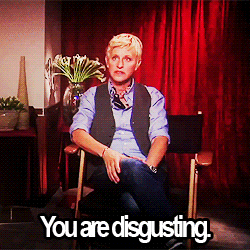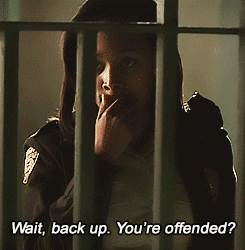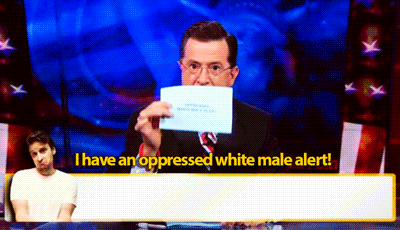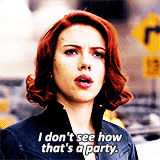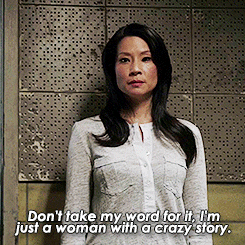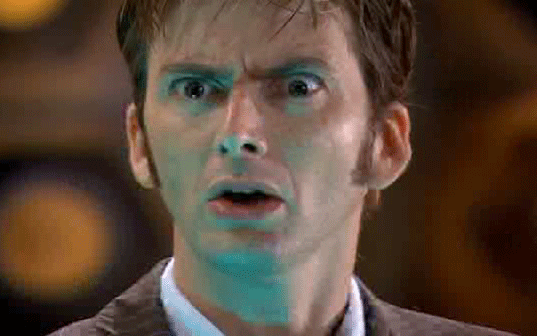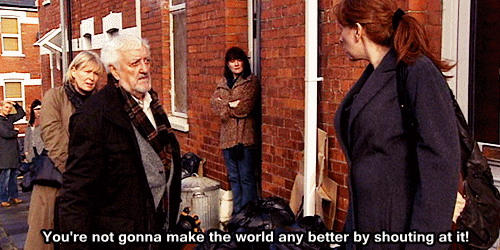Apparently, I’m Making Peter Capaldi Sad: Doctor Who and Exclusion
Posted: September 18, 2013 | Author: Suzanne | Filed under: Activism, Bisexuality, Culture, Doctor Who, Fantasy, Gender essentialism, Heterosexism, Media Erasure, Racism, Representation in Doctor Who, Science Fiction, Social Justice | Tags: BBC, Doctor Who, Gender Essentialism, Heterosexism, John Hurt, Matt Smith, misogyny, Peter Capaldi, racism, Silencing Mechanism, Steven Moffat, Transmisogyny, Twelfth Doctor, Welcome to the Party | 51 Comments[Content note: misogyny, racism, whitewashing, transmisogyny, heterosexism, bad faith, flashing GIFS)]
Okay. Let’s talk about Doctor Who, shall we?
(artist/writer: ponyscribbles on tumblr)
A month ago, the BBC announced that Peter Capaldi will play the Doctor in Doctor Who after Matt Smith steps down. He’ll be the twelfth regeneration of the doctor. And the twelfth white man to play the role.
I think most fans were pleased. Peter Capaldi apparently has quite a following in Great Britain (as an American, of course, the only time I’ve seen him was in the Doctor Who episode “The Fires of Pompeii”). He seems like a great actor, and a lovely person.
A large group of fans, however, were quite disappointed. I was among them. We’d hoped – against all odds – that this would be the regeneration where the Doctor was finally played by a POC and/or a woman. This was our chance. We’d been discussing it for years, but now – maybe now – it could finally happen. The BBC even put up a poll asking whether the 12th Doctor would be a man or a woman, thus acknowledging the possibility of a female Doctor.
[note: I use “we” a lot in this post. I use “we” not because we all share the same oppressions and marginalizations, but because we’ve all been erased by, and ignored by, Doctor Who (and other media). But I don’t mean to conflate my identity with those of other marginalized people: as a white cisgendered woman, I’m relatively privileged, even when it comes to media representation]
We knew there wasn’t much of a chance.
But we hoped.
So yeah, a lot of us were majorly disappointed when it was another white guy.
And then, in the midst of my frustration, I saw the above comic. And lo, I saw the error of my ways, and stopped complaining about Peter Capaldi’s casting.
Ahem.
Sorry about that. No, this is not going to be a post about how I finally learned to stop complaining and love oppression. And my sarcasm is probably also making poor Peter Capaldi cry. Sorry, Mr. Capaldi. You actually do seem lovely.
This comic isn’t some giant exception to the rule. Everywhere on the internet, you’ll find this idea that we’re being mean or unfair to Peter Capaldi by criticizing his casting.
So let’s talk about it, okay? *Really* talk about it.
I’m going to establish a few things upfront: I think I will really enjoy Peter Capaldi as the Doctor. I’m betting he will be a great Doctor. He seems, from everything I’ve seen of him on the interwebs in the past two weeks, to be a great actor. I’m also glad an older actor is playing the Doctor – it will make a nice change from Matt Smith and David Tennant.
I also love Doctor Who. I think it’s a great, beautiful, ridiculous, wonderful show. I would not bother to argue about it as much as I do if I did not love it. I would not keep watching it if I did not truly believe in its promise and its potential. I would not be a fan if I did not believe it had a place for people like me.
We’ve gotten those things clear? Good.
Here’s the rub, my friendly readers: I’m also disappointed as fuck in Capaldi’s casting. I know! It’s so shocking. But it is, in fact, possible for me to feel more than one emotion about an event. I am a human being, and I can grasp complexity. I can be excited and disappointed at the same time.

SHOCKING!
Yes, I wanted the Doctor not to be a white man.
One of the most wonderful things about the Doctor is his (1) capacity for change. He constantly regenerates into completely different bodies. He is never static, never singular, always chaotic. He is simultaneously one and many. Everything about him is changeable, and changing.
So can you blame fans who want the Doctor’s various incarnations to reflect of the diversity of the world around him? To change races, genders, gender identities, ages, shapes, ability levels, sexualities, etc? In fact, it doesn’t make any sense for the Doctor to *not* change things like race and gender. To convince yourself that the Doctor should *always* be a white man, you’re ignoring the central tenant of his identity: nothing about him is unchangeable.
Except that some things are.
We’ve now had twelve doctors – with a recently revealed thirteenth (John Hurt) (2)- and they’ve all been white cisgendered men. Everything about the Doctor can change, apparently, except his race, gender and gender identity.
I cannot stress how incredibly depressing it is for people who are already erased, ignored and marginalized by the media to see a show like Doctor Who – which has a built-in excuse for being as diverse and inclusive as possible in their casting – just keep casting white men. It’s almost deliberately cruel. “We could include you, but we choose not to. Let them eat the kyriarchy!”
So yeah, I’m pissed that Peter Capaldi was cast as the twelfth Doctor.
I’m pissed because there is absolutely zero evidence that showrunner Steven Moffat even considered casting anyone but a white man. Because, as Moffat put it, he had a shortlist of one: Peter Capaldi.
To everyone who has said: “Well, Capaldi was probably just the best actor for the part.” Really? How would Moffat even know that if he never bothered to audition anyone else? I mean, this isn’t a case of a white male actor legitimately beating out a bunch of actors of color and/or female actors through a stringent audition process. This is a case of a white man just being chosen, without anyone else getting a shot.
(If nothing else, it shows a shocking lack of imagination from Stephen Moffat. “I could only think of one person! So I cast him!”)
I’m pissed because Moffat has had three chances to cast a Doctor – Matt Smith, John Hurt and Peter Capaldi – and *all* of them have been thin white men. All of them. I have given up any notion that he gives a shit about inclusion. He’s had more chances than any modern Doctor Who showrunner to make the show more diverse, and he’s refused all of those chances.
I’m pissed because Moffat denigrated the very idea of a female Doctor. When asked about Helen Mirren’s call for a female Doctor, Moffat joked that the Queen should be played by a man next time.
Which… wow. This simultaneously brings in transmisogyny (because there’s nothing more hilarious than drag queens and men who dress up as women, am I right?), a false equivalence, and stunning amount of bad faith. Having a woman play a traditionally male role is not the same as having a man playing a traditionally female role. Women are underrepresented in the media, so giving a woman a traditionally male role is being inclusive. Men are *already* well-represented in the media, so giving a man a traditionally female role only exacerbates the lack of inclusion.
And also: bad faith. Queen Elizabeth should be played by a woman because the Queen is an actual historical figure who is female. The Doctor is not an actual historical figure. Moreover, the Doctor is a person whose identity constantly changes. Are you actually saying that being male is a constant part of the Doctor’s identity? That he can be anything – except that he must always be a man?
I’m pissed because of the message Moffat sends – and the show sends – by constantly casting white men. I’m pissed, because it it implies that gender and race are so *essential* to a person’s identity that they are the one thing an ever-changing alien can never change. It implies that those two things are so fucking fundamental that changing them would ruin the character.
Which is not at all a racist or sexist notion, no. Gender and racial essentialism, everyone!
I’m pissed because this casting is part of a long trend of the showrunners being oppressive and awful. Doctor Who hasn’t had a female writer in three seasons. It hasn’t had a female director in two. It hasn’t had a writer or director of color in at least three seasons (3). It’s female characters get the wonderful privilege of participating in misogynistic storylines, including the mystical pregnancy trope, the “mothers are the most powerful people in the world because uteruses” trope, the “stalking is super romantic” trope and the “silly women and their obsession with their looks” trope. I’d be upset over the storylines surrounding major POC characters, but the truth is… there really haven’t been a lot of major characters of color in the past three years. And the ones I remember all die (like Rita in “The God Complex”). Moffat himself explains that he doesn’t bother with bisexual representation on Doctor Who because bisexuals are having “FAR TOO MUCH FUN. You probably don’t even watch because you’re so busy.” Asexual representation? Don’t even think about it – Moffat thinks asexuality is boring.
I’m pissed because I see no signs that this is going to change anytime soon.
I’m pissed because whenever we bring this up, we’re being mean.
We’re being mean. We’ve been systematically ignored and erased on the show. People like us are denied representation, made fun of and stereotyped. We’ve gone through thirteen Doctors with no sign that we’re ever going to get representation – even though the show’s own rules mean it makes *no sense* for the Doctor to keep being white and male. We don’t have representation in the writer’s room or the director’s chair.
Peter Capaldi and Stephen Moffat are powerful people. They have nice big salaries. They’re media creators. One of them is the head of one of the most successful franchises in the world, the other is about to be one of the most famous actors on the planet.
But we’re making them feel bad.
… somehow, I kind of doubt it.
Comics like the one above are a silencing mechanism. They’re meant to make us feel bad for voicing our reality. For talking about the very real misogyny, heterosexism, transmisogyny and racism displayed by Doctor Who and its showrunners. They’re meant to make it seem like *we’re* the ones who haven’t been inclusive, even though we’re the ones who have been systematically marginalized by the show and the showrunners. But we’re not inclusive. Because inclusive means no one ever feels bad. Especially not the poor, powerful white men who keep getting roles and jobs and representation.
Comics like the one above rewrite the narrative of Doctor Who. They rewrite our very real grievances, transforming marginalized people into a bunch of complainers who are trying to make Peter Capaldi and the Doctor feel bad.
Why isn’t our sadness ever depicted? Why is it always about the feelings of the most powerful people in the Doctor Who world? Why isn’t it ever about our feelings of exclusion, our feelings of marginalization, our anger at being erased and ignored? Why – even in a comic that is supposed to be about *us* complaining – why is it about Peter Capaldi?
Why aren’t we ever the protagonists of these stories?
***
… you know, on one level, this cartoon perfectly encapsulates the problem. Powerful white men in the Doctor Who world give other white men influence – as writers, directors and actors – while systematically ignoring the criticisms of those who feel excluded from the show. White men keep all the power for themselves, while making the people they’ve marginalized feel bad for complaining about it. White men take the issue of system oppression and make it all about them.
Stephen Moffat hands the screwdriver over to Peter Capaldi, and then, when people point out they’ve never had a chance at that screwdriver, he berates them for making the new Doctor feel bad.
Frankly, everyone, I appreciate your concern for the Doctor, but seriously: the Doctor is a fictional character, and I can’t make him feel bad. So I’m not terribly worried about it. I’m not even worried about making Peter Capaldi feel bad: he’s got the job now, and he’s probably surrounded by wonderful people cheering his casting. And good for him! I don’t *want* him to feel bad. I don’t want him to feel bad, because it’s not his fault. He’s just the manifestation of a larger phenomenon.
The truth is, I don’t even think the comic writer above – and all the fans and creators who are trying to shut down complaints – care that much about Peter Capaldi’s feelings.
I think they want us to stop hurting *their* feelings. I think they want fans with legitimate grievances with the show to shut up.
Shut up, and let us enjoy Capaldi’s casting. Shut up and let us enjoy the show. Shut up and don’t remind us that some of this stuff is problematic. Shut up – I don’t want to feel guilty for enjoying the party. Shut up – I don’t want to think about the racism and the sexism while I’m watching my favorite show.
Please stop hurting my feelings. I don’t want to know about your problems.
I just want to enjoy the party. Why can’t you let me enjoy the party?
And I’m sorry to those people. I’m sorry that we’re making it harder for you to enjoy the Doctor Who party. But we’ve been left out of the party entirely, and we’d really like to come in. I’m sorry that when we press our noses up against the windows of the Doctor Who party, you feel bad. I’m sorry that we’re taking away from the glamour and excitement of the occasion, all bedraggled and locked-out as we are. But no one seems to be coming towards the door to let us in. And we’d really like to come in.
It’s not just that we’ve been locked out. We’re supposed to shut up about it. We’re simultaneously supposed to accept our outsider position – the constant attacks on our right to be fans of the show, and our right to see people like us represented in the show – while never complaining about it. The show can lock us out, and we should never ever complain about it. Because we’re the problem. The walls and the lock and the people who hold the key aren’t the problem. We’re the problem.
We’re always the problem.
I love the show. I’d love to come into the party and enjoy it with you. But I can’t.
It’s adorable that you think people like me have the power to bar Peter Capaldi from the party. But while he’s inside enjoying the celebration, most of us are still waiting for our invite.
It’s great if you can unreservedly enjoy the entrance of Capaldi into the canon. Hey – it’s also great if you’re part of a marginalized group and you can *still* enjoy the entrance of Capaldi without reservation.
But stop telling those of us who see it as the shutting of another door, the turning of another lock, the erection of a new barrier that we don’t get to talk about it. Remember that you can be a fan of problematic things. That liking something problematic doesn’t make you a bad person – but pretending something *isn’t* problematic does. Don’t silence the people who want an oppressive show to change. Don’t silence us.
Don’t watch the show bar the doors on its marginalized fans, and then accuse those same fans of not being inclusive enough.
Don’t lock us out of the party and then get angry when we make noise about it.
And maybe – just maybe – consider letting us in to party with you.
***
(1) I’m using male gender pronouns to refer to the Doctor because he’s only ever presented as male, and his latest incarnation is male
(2) It is unclear where John Hurt figures in continuity, or even whether he’s the Doctor. All we know is that he’s one of the Doctor’s regenerations.
(3) I went through each director and writer for the past three seasons and checked their race and gender. Obviously, this is a subjective process, since I’m one person, and there aren’t a billion pictures of all the writers. But I’m 95% sure that there have been no directors or writers of color in the past three seasons.
***
Commenting Policy: I’m going to make this explicit: this is a space to discuss the feelings and needs of marginalized fans of Doctor Who. It’s not a space for privileged fans to come in and say “well, this is what *I* want” or “I’m white and male, and I’m okay with the Doctor always being a white man!” That is welcome in almost every discussion on the internet. Not here.
Furthermore, if you want to argue that the Doctor should stay a white man, you’d better have a better argument than “because I like him that way.”
Because when the argument is “The Doctor’s static race and gender contributes to oppression and actively hurts already-marginalized people”
and your counterargument is “But I like him being a man!”
You sound like a fucking douchecanoe.
Again: This is a space to discuss the feelings and needs of marginalized fans of Doctor Who. Talking about the ways Doctor Who is oppressive is fine! Talking about general issues of oppression is fine! Talking about liking the show despite its problems is also okay! But this is a space that centers the needs of marginalized fans. Not privileged ones.
Female Creators in Science Fiction and Fantasy Television: The Stats
Posted: May 22, 2013 | Author: Suzanne | Filed under: Activism, Culture, Fantasy, Feminism, Rants, Science Fiction, Social Justice | Tags: Beauty and the Beast, Doctor Who, Drop Dead Divas, Elementary, Fringe, Game of Thrones, GIF, Grimm, Once Upon a Time, Person of Interest, Revolution, Showrunners, Stephen Moffat, Teen Wolf, Television, True Blood, Vampire Diaries, Walking Dead, Women in Television | 10 CommentsOH HAI EVERYONE. I’m back! After writing my senior thesis and then *dying* for a few weeks. I SHOULD BE BACK MORE REGULARLY. I will tell you all about my journey with Tiptree, Russ and Butler soon. Maybe. Feminist Science Fiction, yay!
(can you tell I’m still exhausted from the end of the semester?)
Anyways. Back to your regularly scheduled yelling and rants and statistics!
***
[Content Note: GIFs, misogyny, racism]
Whenever I explain about why I prefer television to movies, I throw one random line in: “Television is more friendly to women.”
Don’t ask me where I first got that idea. It’s one of those unexamined assumptions floating around my brain. But I’m not the only one who thinks this way. It seems like a broadly accepted truth that television is some kind of haven for women. Movies are aimed towards men. Videogames are aimed towards men. But more women watch television. Waaaay more women watch television. Network prime time television has 65-70% female viewership. Some stations, like the CW, go up to 70-75%.
With those kinds of numbers, television as a medium must be female friendly, right? It must have lots of female creators and female characters and female-friendly stories, right?
See, this is why I should always examine my unexamined assumptions.
Because: Nope.
Sure, women watch more TV. But according to the Geena Davis Institute on Gender in Media, only 38.9% of characters in prime-time programs are women (compared to a 60%-65% female viewership). Only 22% of prime time shows feature girls and women in roughly half of all speaking parts. And 20% of shows cast men or boys in 75% or more of speaking roles.
TV! The Land of Women Mostly Men!
(also, I swear to claude, if anyone responds “but there are more men on TV because women WANT to see more men because all women are attracted to men and only want to see men men men men and they hate women” I will throw things. LOTS OF THINGS)
So that’s what’s happening on-screen. But what about off-screen? Who is creating these shows? Who produces them, directs them, writes them?
Every year when the Oscars come around, feminists (including me) complain about how few female writers and directors are recognized by the academy. Movie directing and writing is still very much a boys-club.Given the high female viewership, would it be different for TV? Do female creators thrive in television?
(probably not, tho)
Two months ago – right before the hell of writing my honors thesis hit – I decided to find out. Given my interest in SF/F – and the time necessary to gather the stats (the numbers for one TV show takes about 15 minutes, which sounds fine… until you realize there are hundreds of prime-time shows) – I decided to concentrate on female creators in SF/F television. Plus, in SF/F fandom, we often talk about the number – and visibility – of female creators in books, in comics and in movies. The television stats, I thought, would make an interesting addition to the discussion, especially given how many big, influential SF/F shows there are on TV today.
The following statistics are very ad-hoc. Very ad-hoc. Which isn’t to say that they aren’t interesting, or that they don’t speak to the general state of female creators in SF/F television. But they were done by one overwhelmed blogger with a weird methodology. They are not supposed to be the be-all, end-all of a discussion.
Thus: I made a list of as many SF/F shows that appeared in North America in 2012 and 2013 and that I could think of/find on the internet. I was pretty loose about the definition of SF/F, which is why you’ll see shows like Elementary and Drop Dead Diva (she is a GHOST) on the list. I only looked at one season of each show: for those shows that had more than one season, I chose whichever season was most current. So for Supernatural, I looked at Season 8 (the 2012-2013 season) as opposed to Season 7 (the 2011-2012 season), while for Eureka, I looked at the 2012 season (because that was the show’s last season).
The twenty six shows I covered are: Lost Girl, Eureka, Beauty and the Beast, Being Human (US), Alcatraz, Arrow, Touch, Fringe, The Neighbors, Last Resort, Revolution, Vampire Diaries, True Blood, Once Upon A Time, Person of Interest, Drop Dead Diva, The Walking Dead, Alphas, Warehouse 13, Supernatural, Game of Thrones, Elementary, Grimm, Falling Skies, Teen Wolf and Doctor Who.
I only took stats on episodes that had already aired, which would have been a great idea if I hadn’t let two months go by between gathering the stats and writing up this post. This is why, for example, I looked at Game of Thrones season 2, instead of Game of Thrones season 3 – season 3 hadn’t started when I gathered the stats. Like I said: this stats gathering is wonky. WONKY. I thought about redoing the stats for shows that aired more episodes, but it took me twelve hours of work to gather stats the first time and I’m lazy. So, fair warning.
(Fun experiment: if you were really dedicated, you could use these stats to figure out the exact date when All The Shit Hit The Fan and I had to abandon my blog for three months)
Once I had the 26 shows, I calculated the gender breakdown for
1. The Executive Producers (colloquially known as the showrunners)
2. The episode directors
3. The episode writers
4. How many episodes were written by men v. women. As I quickly realized, sometimes a show can have a fair number of female writers… while most of the episodes are still written by men.
The results were… interesting. And by interesting, I mean “depressing.”
In 77% percent of SF/F shows, less than half the writers were female. 77%. Twenty out of twenty six.
Twenty three percent of shows – 6 shows – had 50% or more female writers. Out of those 6 shows, only three had a majority of female writers (three shows were exactly gender-balanced). So basically, 77% of shows are majority-male written, 11.5% are majority-female written, and 11.5% are perfectly gender-balanced.
On average, 68.2% of writers for SF/F shows were men, while 31.5% of them were women.
I want to go deeper in those numbers, because there might be an instinct to go “well, there are some shows where men dominate, and some shows where women dominate, and it all evens out.” Which: no.There are 77% of shows where men dominate, and 11.5% of shows where women dominate, so it’s clearly NOT evening out. But even in those shows where women “dominate,” they don’t dominate in the same ways men do. Numbers, please!
The highest percentage of female writers on a show is 57%. The highest percentage of male writers is 100% (in fact, there are two shows – Doctor Who and Teen Wolf – where all the writers are male). The lowest percentage of male writers is 43%. The lowest percentage of female writers is 0%. In other words, while there are shows with no female writers, there are no shows that do not have male writers. There is always male representation, and the lowest male representation is 43%… for two out of twenty six shows.
In 31% of SF/F shows, less than one fourth of the writers were female. Most shows – 46% – employ between 25% and 49% percent female writers. 11.5% employ exactly the same number of men and women, and 11.5% employ a higher number of women (between 51-57%).
Do women thrive as SF/F television writers? I don’t know about you, but I would not call that “thriving.”
If you think the numbers for female writers are depressing, you might want to take a second before we move on to the statistics for female directors. Trust me, we haven’t even gotten to the best worst part.
Out of twenty six shows, absolutely NONE had 50% or more female directors. Zero. Zip. Nada.
Ten of the twenty six shows – Thirty eight percent – had ZERO female directors. A whooping 96% of the shows had 75% or more male directors.
Let me rephrase that: in twenty five out of twenty six SF/F shows, less than one fourth of the directors were female. Only one show had more than 25% female directors.
On average, 89.9% of directors for SF/F shows were men, while 10.9% of them were women. Men aren’t just a majority of directors. They’re an overwhelming majority. Women barely have any presence at all.
So that’s the cursory overview state of women in the marvelously female-friendly land of television.
Unexamined assumptions, huh? Really worth examining.
Here’s the complete breakdown for writers, directors and executive producers for all twenty six shows. I put them in order of highest-to-lowest percentage of female writers (which yields results both obvious – Game of Thrones is #21 – and surprising: Elementary is #22).
1. Lost Girl (Season 3)
Episodes: 7
Executive Producers: 3 (2 men, 1 woman) 33% women, 67% men
Director: 6 (5 men, 1 woman) 16% women, 84% men
Writers: 7 (3 men, 4 women) 57% women, 43% men
-episodes written only by women: 4 (57%)
-episodes written only by men: 3 (43%)
2. Eureka (season 5)
Episodes: 13
Executive producers: 2 (1 woman, 2 men) 33% women, 67% men
Directors: 8 (3 women, 5 men) 37.5% women, 62.5% men
Writers: 14 (8 women, 6 men) 57% women, 43% men
– Episodes written only by men: 3 (23%)
– Episodes written only by women: 4 (30%)
– Episodes written by both: 6 (46%)
3. Beauty and the Beast (Season 1)
Episodes: 14
Executive producers: 11 (3 men, 8 women) 27% women, 73% men
Director: 12 (11 men, 1 woman) 8% women, 92% men
Writer: 11 (6 women, 5 man) 54% women, 46% men
– written only by men: 4 (28.5%)
– written only by women: 6 (43%)
– written by both: 4 (28.5%)
4. Being Human (season 3)
Episodes: 7
Executive producers: 2 (1 man, 1 woman) 50% men, 50% women
Directors: 4 (3 men, 1 woman) 75% men, 25% women
Writers: 8 (4 men, 4 women) 50% men, 50% women
– Episodes written only by men: 3 (43%)
– Episodes written only by women: 3 (43%)
– Episodes written by both: 1 (14%)
5. Alcatraz (season 1)
Episodes: 13
Executive Producers: 5 (4 men, 1 woman) 20% women, 80% men
Directors: 8 – all men (100% men)
Writers: 10 (5 men, 5 women) (50% women, 50% men)
– Episodes written only by men: 4 (31%)
– Episodes written only by women: 4 (31%)
– Episodes written by both: 5 (38%)
6. Arrow (Season 1)
Episodes: 16
Executive Producers: 4 (all men) 100%
Directors: 13 (12 men, 1 woman) 8% women, 92% men
Writer: 10 (5 men, 5 women) 50% men, 50% women
– Episodes written only by men: 7 (44%)
– Episodes written only by women: 3 (19%)
– Episodes written by both: 6 (37%)
7. Touch (season 2)
Episodes: 5
Executive producers: 7 (3 women, 4 men) 43% women, 57% men
Directors: 4 (all men) 100% men
Writers: 5 (2 women, 3 men) 40% women, 60% men
– episodes written only by men: 3 (60%)
– episodes written only by women: 2 (40%)
– episode written by both: 0
8. Fringe (Season 5)
Episodes : 13
Executive producers: 1 man (100% male)
Directors: 12, all men (100% male)
Writers: 5 (3 men, 2 women) 40% women, 60% men
– 9 episodes written by only men (69%)
– 4 episodes written by only women (31%)
– 0 written by both
9. The Neighbors (season 1)
Episode: 18
Executive producers: 4 (all men) 100% men
Directors: 7 (all men) 100% men
Writers: 10 (4 women, 6 men) 40% women, 60% men
– Episodes written only by men: 9 (50%)
– Episodes written only by women: 4 (22%)
– Episodes written by both: 5 (27%)
10. Last Resort (season 3)
Episode: 13
Executive Producers: 4, all men 100% men
Directors: 10 (8 men, 2 women) (20% women, 80% men)
Writers: 11 (3 women, 8 men) (37.5% women, 62.5% men )
– Episodes written only by men: 9 (70%)
– Episodes written only by women: 4 (30%)
– Episodes written by both: 0 (0%)
11. Revolution (season 1)
Episodes: 10
Executive Producers: 3 (all men) 100% men
Directors: 8 (all men) 100% men
Writers: 8 (3 women, 5 men) 37.5% women, 62.5% men
– Episodes written only by men: 6 (60%)
– Episodes written only by women: 2 (20%)
– Episodes written by both: 2 (20%)
12. Vampire Diaries (season four)
Episodes: 15
Executive Producers: 4 (2 men, 2 women ) – 50% men, 50% women
Directors: 12 (11 men, 1 woman) – 91% men, 9% women
Writers: 11 (4 women, 7 men) – 36% women, 64% men
– 6 episodes written only by men (40%)
– 5 episodes written only by women (34%)
– 4 episodes written by both (26%)
13. True Blood (Season 5)
Episodes: 12
Executive producer: 2 (both men) 100% men
Directors: 9 (8 men, 1 woman) 11% women, 89% women
Writers: 6 (2 women, 4 men) 33% women, 67% men
– Episodes written only by men: 8 (67%)
– Episodes written only by women: 4 (37%)
– Both: 0 (0%)
14. Once Upon a Time (Season 2)
Episodes: 15
Executive Producers: 2 (both men) 100% men
Directors: 10 (9 men, 1 woman) 90% men, 10% women
Writers: 10 (3 women, 7 men) 70% men, 30% women
-10 episodes written by only men (67%)
– 4 episode written by only women (27%)
– 1 episode written by both (6%)
15. Person of Interest (season 2)
Episodes: 16
Executive Producers: 5, all men (100% male)
Directors: 11 (10 men, 1 woman) 9% women, 91% men
Writers: 13 (4 women, 9 men) 30% women, 70% men
– 9 episodes written only by men (60%)
– 3 episodes written only by women (15%)
– 3 episodes written by both (15%)
16. Drop Dead Diva (Season 4)
Episodes: 13
Executive Producers: 5 (all men) 100% men
Directors: 9 (8 men, 1 woman) 11% women, 89% men
Writers: 11 (3 women, 8 men) 27% women, 73% men
– Episodes written only by men: 9 (69%)
– Episodes written only by women: 1 (8%)
– Episodes written by both: 3 (27%)
17. The Walking Dead (Season 3)
Episodes: 12
Executive producers: 2 (both men) 100%
Directors: 9 (2 women, 7 men) 22% women, 78% men
Writers: 8 (2 women, 6 men) 25% women, 75% men
– Episodes written only by men: 8 (67%)
– Episodes written only by women: 4 (33%)
– Episodes written by both: 0 (0%)
18. Alphas (season 2)
Episodes: 13
Executive Producers: 6 (all men) 100% men
Directors: 8 (6 men, 2 women) 25% women, 75% men
Writers: 11 (8 men, 3 women) 27% women, 73% men
– Episodes written only by men: 9 (69%)
– Episodes written only by women: 1 (8%)
– Episodes written by both: 3 (27%)
19. Warehouse 13 (season 4)
Episodes: 10
Executive Producers; 3 (all men) 100% men
Directors: 6 (all men) 100% men
Writers: 9 (2 women, 7 men) (22% women, 78% men)
– Episodes written only by men: 6 (60%)
– Episodes written only by women: 4 (40%)
– Episodes written by both: 0
20. Supernatural (season 8)
Episodes: 16
Executive Producers: 1 (male)
Directors: 14 (14 men) 100% men
Writers: 9 (7 men, 2 women) – 22% women, 78% men
– 12 episodes written only by men (81%)
– 1 episode written only by women (6%)
– 3 episodes written by both (13%)
21. Game of Thrones (season 2)
Episodes: 10
Executive producers: 2 (both men) 100% men
Directors: 5 (all men) 100% men
Writers: 5 (4 men, 1 woman) 20% women, 80% men
– episodes written by only men: 8 (80%)
– episodes written by only women: 2 (20%)
– episodes written by both: 0
22. Elementary (Season 1)
Episodes: 17
Executive producers: 4 (3 male, 1 female) – 25% women, 75% men
Directors: 14 (11 male, 3 female) – 20% women, 80% men
Writers: 12 (2 women, 10 men) – 16% women, 84% men
– 13 episodes written only by men: 76%
– 2 episodes written only by women: 12%
– 2 episodes written by both: 12%
23. Grimm (season 2)
Episodes: 12
Executive Producers: 5 (all men) 100%
Directors: 12 (2 women, 10 men) 17% women, 83% men
Writers: 10 (1 woman, 9 men) 10% women, 90% men
– Episodes written only by men: 9 (90%)
– Episodes written only by women: 1 (10%)
– Episodes written by both: 0
24. Falling Skies (season 2)
Episodes: 10
Executive Producer: 1 (male) 100% men
Directors: 7 (6 men, 1 woman) 14% women, 86% men
Writers :7 (6 men, 1 woman) 14% women, 86% men
– episodes written only by men: 8 (80%)
– episodes written only by women: 2 (20%)
25. Teen Wolf (Season 2)
Episodes: 12
Executive Producers: 6 (5 men, 1 woman) 16% women, 84% men
Directors: 2 (all men) 100% men
Writers: 6 (all men) 100% men
26. Doctor Who (series 7)
Episodes: 6
Executive Producers: 1 (man) 100% men
Directors: 4 (all men) 100% men
Writers: 3 (all men) 100% men
(note: the executive producer stats are BY FAR the most fuzzy. With some shows, it’s really hard to tell WHO the showrunner is. So take those stats with a MASSIVE grain of salt, and correct me if I’m wrong)
****
A few weeks after I took these statistics, articles began to pop up about Steven Moffat, Doctor Who’s showrunner. Apparently, people figured out that he hadn’t had a female writer on the show during his entire tenure as showrunner.
I will not lie! My initial reaction was: “Damn, they got the drop on me. This is why you publish blog posts EARLY, girl.”
Anyways – people were understandably mad at Stephen Moffat. Doctor Who is a very popular Sci-Fi show – more importantly, it’s a show that is very popular with women. Steven Moffat has had thirty two episodes to work with. You’re telling me he can’t find one female writer he wants on the show? Over thirty two episodes? Not a single one?
Yeah, it’s pretty terrible.
It’s also worth noting that Steven Moffat has had zero female directors and zero female writers on the other show he runs, Sherlock. And he hasn’t had a female director on Doctor Who in two series (twenty four episodes). So it’s a pretty obvious pattern.
But here’s the thing. Steven Moffat is not a glaring exception from the norm. Steven Moffat is the norm. A slightly more extreme version, yes. But only slightly.
And listen, I do not like Steven Moffat. At all. My boyfriend and I recently watched all of Doctor Who, and it’s pretty striking how quickly our attitude went from “yay, another Doctor Who episode to watch!” to “… I guess we should watch the next episode of Doctor Who, huh? Blurrrgh” when Moffat took over as showrunner.
(Aside from anything else, he’s not a good writer. Example: WHY THE FUCK DID THE TARDIS BLOW UP? Are we ever going to find out? WHY DID THE SILENCE NEED RIVER SONG IN THE FIRST PLACE, if the spacesuit was CONTROLLING THE PERSON INSIDE IT?) Plus Steven Moffat is terrible to female characters. Like, painfully terrible. I have so many rants stored up about his treatment of Amy Pond, River Song and Clara Oswin.
… sorry, that rant was supposed to be shorter. Point being: I do not like Steven Moffat. I do not want to defend Steven Moffat. But he is not alone in his show’s lack of female creators. So if we’re going to call him out for his lack of female writers, we should also call out all the other shows with few – or zero – female writers and directors.
And that’s basically all of them.
Put it this way: I’m worried we’re turning Steven Moffat into the bogeyman. He’s terrible to female characters! He’s terrible to female creators! He says the most despicable shit in interviews (as a bisexual woman, I particularly enjoyed his comment that he doesn’t put bisexuals on his shows because “[bisexuals] are too busy having fun” to care about representation. Thanks. No, seriously). So we (correctly) get outraged and yell at him a lot, and call him out etc.
But meanwhile, we don’t even notice that, say, Elementary’s writers are 80% male, and its directors are 84% male. Elementary is a great show for female representation. It’s a great show for POC representation. It includes all kinds of feminist concepts like boundaries, consent, good treatment of abuse victims, gaslighting etc. But behind the scenes? It’s only a tiny bit better than Doctor Who.
How about Once Upon A Time, a show where the hero, the villain and a whole lot of the main supporting characters are all female? Where there are a lot of kick-ass, interesting, complex women? Where women are portrayed in a variety of ways (not just the Strong Female Character TM?) Ninety percent of their directors are men. Seventy percent of their writers are men.
(and it’s a show that tends to fail pretty hard on female characters of color).
So why does it matter? If a show is doing well in terms of female representation, why should we care if their writing staff and directorial pool is filled with men?
That argument – the “good representation in one area negates bad representation in another” argument – is, I submit to you, poppycock.
Having more women writing, producing and directing TV shows is good in and of itself. Not just because it might bring about better female representation – as we’ve seen, men are capable of writing good female characters, and of avoiding sexist narratives. Better female representation might be a side effect of more female writers, producers and directors, but it’s not the only reason to push for it.
Both Elementary and Once Upon A Time do a better job with female characters than Doctor Who. A way better job. Hell, I would go so far as to say that even Game of Thrones does a better job with female characters (when it’s not busy adding more sexism to the source material). But it’s not just how you write the female characters in your show. It’s not just how you incorporate feminist concepts into your script. It’s also who you think is good enough to CREATE that show. To create those worlds. To tell those stories.
For most SF/F shows, the people they think are good enough to create those shows and tell those stories are – men. Sure, there are a few women thrown in there. But mostly, it’s men.
And not having good representation of female creators isn’t just an implicit commentary on who you think is good enough to create a show. It also has economic consequences.
Having more female creators on TV shows is important because it means women are getting paid. I don’t know how to spell it out more clearly: these are jobs. These are jobs for which people are getting paid. And women are not getting paid to do these jobs, because women are not getting these jobs. It’s part of the reason I thought the sexism on American Idol in the last two seasons was particularly terrible – by denying women a chance to compete in the higher ranks of Idol, you’re denying them a higher paycheck. And that matters. On a basic, fundamental level, this is about money and jobs. Money and jobs that women cannot get, even on shows that are supposed to be catering to women (like the Vampire Diaries or True Blood). We need to support women economically just as much as we need to support women creatively.
And yes, representation offscreen is also important because it’s about supporting women creatively. As the stats show, women are not allowed to write, create, or direct their own stories. Even in shows that are ostensibly about women (Once Upon A Time, True Blood etc.) and that are ostensibly aimed towards a female audience, men are the ones creating, crafting and writing women’s stories. We don’t get control over our own narratives. Which is problematic because women are a marginalized group. The right to self-definition is one we rarely have – we are the other, not the self. The Self – men – get to define us. And part of breaking down oppression and marginalization is gaining the ability to define ourselves – to write ourselves, to tell our own stories.
(This is not an argument that no man should ever write about women. It’s an institutional problem, not an individual one, which we can change by getting *more* women into the industry. Nor is it an argument that women are obligated to write about women – it’s important women be able to write about men, particularly since many people still think women are restricted to writing about their own experiences)
Moreover, most showrunners – the people who create those new shows, new mythologies, new characters, new stories – start off as TV directors or TV writers. If we want more showrunners to be women, we need to give them access to writing and directing jobs.
In other words, when we think about women in the television industry, we need to remember that both women’s representation onscreen and women’s representation offscreen matters. We shouldn’t write off bad representation behind the scenes just because a show has good female characters onscreen; a show can do well in one respect and fail in the other. And both sorts of representation (or lack of representation) have consequences.
For example, consider a girl who loves Doctor Who. She loves Amy Pond (one of the Doctor’s recent companions) so much that she decides to become a writer, just like Amy. And since she enjoys SF/F TV so much, she decides to become a television writer. Maybe she’ll even get a job on Doctor Who!
The problem is, given the current state of SF/F television (and Doctor Who) – she would probably have a really hard time getting work.
There are consequences to not promoting female creators offscreen.
***
These statistics, unfortunately, are fundamentally flawed. They only look at one axis of marginalization (sexism), and they do so with no real intersectionality. It is undoubtably the case that women of color have an even harder time getting jobs writing or directing SF/F TV shows. It’s almost certainly true that there are very few POC (men or women) writing or directing network television. That I didn’t look at these statistics means that my conclusions are inherently flawed – I can tell you that women are less likely to be hired, but I can’t tell you if certain kinds of women (white women, straight women, abled women) have an easier time, or if women are more likely to be hired than POC. Partially, these flaws come from the fact that it’s much easier to tell how many women v. men write a show – you can just count names (ah, the convenience of gendered names). I also tried to figure out number of POC writing for certain shows, and felt really gross, as a white woman, trying to guess who was a POC and who wasn’t from pictures (when I couldn’t find any self-identification).
But I do think the information I didn’t gather – information on race etc. – is crucial to understanding who exactly is allowed to create SF/F television.
For example, in taking a second look at Elementary, I realized that even if Elementary doesn’t do a great job with female writers and directors, it does do a pretty good job in terms of Directors of Color. They had at least two WOC and three MOC directing episodes (out of twenty four episodes). Which isn’t perfect, but it’s a lot better than most shows. While that doesn’t negate Elementary’s lack of women, it does provide an extra dimension to consider (and gives me hope that they’re *trying*)
Here are some broad, if incomplete, statistics to add to my numbers. According to the Writers Guild of America West, 87.3% of television screenwriters are white (while only 63.7% of the US population is non-hispanic white/european American). And 55 shows in the 2011-2012 television year hired no writers of color. Those shows include Game of Thrones and Once Upon A Time.
I mean, again: even shows that are good about representation onscreen can be terrible about representation behind the scenes (not that either Game of Thrones or Once Upon A Time is good about POC representation onscreen). And it’s important to document and publicize those aspects of representation.
****
On a final note, these statistics are important because they belie the idea that creators and narratives respond to the audience – as opposed to the patriarchy. One of the most common (misogynistic) arguments you’ll hear when you talk about lack of female creators in literature or in movies or in comic books is that the audience for those mediums is mostly male. Therefore, the creators are mostly male, because they’re best suited to respond to male desires. So it’s not misogyny! It’s just Reflecting the Audience.
This is a bullshit, victim-blaming argument to begin with, but it’s pretty much completely disproven if you look at the television statistics. Women watch way more television than men. Women watch way more network television than men. And yet women are still in the minority – often in the overwhelming minority – when it comes to creating television. It’s an important reminder that institutions don’t primarily respond to the makeup of their audience. They respond to the patriarchy. Comic books are often sexist not because they are aimed towards men, but because they are part of the patriarchy. The movie industry is often sexist not because its products are aimed towards men, but because it is responding to the patriarchy. The solution is not just for more women to watch shows/read comics etc. The solution is to dismantle institutional sexism.
Is it easy? Nope.
Do I know how to do it (except by complaining online a lot and trying to raise awareness)? Nope
Is it worth doing? Absolutely.
Because this is just ridiculous.
(I miss Donna)
(also, as I mentioned, these statistics are super ad-hoc, so if you find errors, or if you want to add information, that would be very welcome! More info/getting a broader picture is always welcome)
(on the other hand, explaining why I am super-wrong and a bad statistics gatherer when I explain UPFRONT the problems with my methodology and *why* I didn’t have the capacity to do better is… not welcome. PRE-EMPTIVE WARNING)

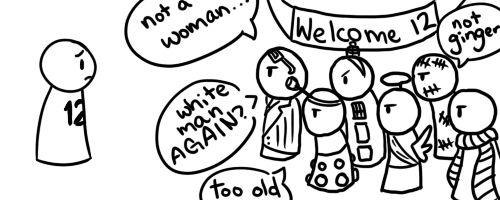



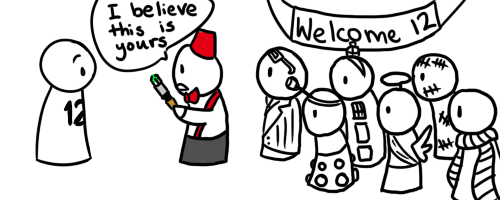
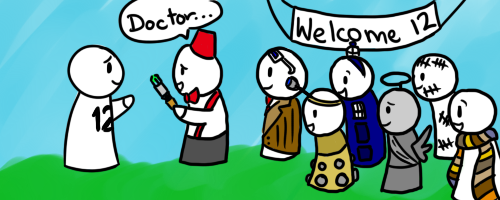 (
(


